|
|
|
Sort Order |
|
|
|
Items / Page
|
|
|
|
|
|
|
| Srl | Item |
| 1 |
ID:
099426
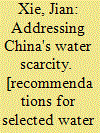

|
|
|
|
|
| Publication |
Washington, DC, World Bank, 2009.
|
| Description |
xxxiii, 160p.
|
| Standard Number |
9780821376454
|
|
|
|
|
|
|
|
|
|
|
|
Copies: C:1/I:0,R:0,Q:0
Circulation
| Accession# | Call# | Current Location | Status | Policy | Location |
| 055319 | 333.910951/XIE 055319 | Main | On Shelf | General | |
|
|
|
|
| 2 |
ID:
146644
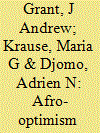

|
|
|
|
|
| Summary/Abstract |
The Africa Day 2015 Symposium provided a unique opportunity to develop glocal networks among activists, learners, scholars, researchers, and community members based in central Canada and other parts of the world. The Symposium examined a wide range of scholarship on Africa including calls for ending oppression based on sexual identity, greater policy responses to health, gender, and human security challenges, improving governance of natural resources, and investigating the prospects for glocal networks. While this scholarship stressed the need for Afro-optimism, it also drew attention to on-going human security challenges faced by many across the continent. This article builds upon the momentum from the Symposium by amplifying the voices of African scholars and enhancing mentorship, emphasizing greater cooperation among researchers and communities based inside and outside Africa, and defeating misconceived allusions to Afro-pessimism. Based on critical scholarship, the article also highlights innovative governance insights that are adapted to specific situations across Africa.
|
|
|
|
|
|
|
|
|
|
|
|
|
|
|
|
| 3 |
ID:
075321
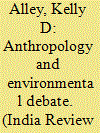

|
|
|
|
|
| Publication |
2006.
|
| Summary/Abstract |
Public anthropology finds company with many other movements in and out of academia today that struggle to open up dialogue on national and global issues and democratize decision-making on problems that most affect people's lives. Public anthropology is a popular emphasis in environmental anthropology where researchers examine contentious struggles and debates over key natural resources. In this paper, I highlight the challenges and predicaments I have faced while documenting an environmental problem in India. I condense these challenges into three kinds of engagements that involve the open-sourcing of science, resource nationalism and news reporting. I explain how these anthropological challenges and predicaments intersect with the goals of Indian river activists and experts as they aim to open up dialogue and decision-making on water issues.
|
|
|
|
|
|
|
|
|
|
|
|
|
|
|
|
| 4 |
ID:
098640
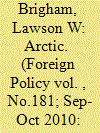

|
|
|
| 5 |
ID:
160787
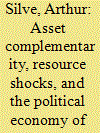

|
|
|
|
|
| Summary/Abstract |
Collaboration between two groups that may invest their resources in a common productive activity has the potential to lead to conflict over the output of that activity. This article examines the stakes of such conflict as well as the willingness for parties to subject themselves to a third-party arbiter. The model highlights three determinants of conflict and of investment in credibility-enhancing institutions: the value of the output, the relative endowments of the parties, and the mutual benefits of collaboration. In particular, the analysis shows that complementarity between the groups’ resources lowers the stakes of political conflict and increases the incentives to commit. The model thus suggests a new mechanism through which we can understand the frequency of conflict and the poor institutions associated in countries with mineral resources. The model’s predictions also help us to understand how Mauritius avoided the resource curse and was able to develop sustainable economic growth.
|
|
|
|
|
|
|
|
|
|
|
|
|
|
|
|
| 6 |
ID:
188444
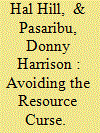

|
|
|
|
|
| Summary/Abstract |
Natural resources—blessing or curse? Indonesia provides an excellent case study for an examination of this question. It is a major commodity exporter; the fourth most populous country in the world; and the world’s largest archipelagic state with huge mineral, forest and maritime resources. Indonesia also has three distinctive features that are particularly relevant for such a study. First, with the exception of the Asian Financial and COVID-19 crises, it has had at least moderately strong economic performance for the past half-century. This distinguishes it from the majority of resource-rich developing countries, and therefore there are lessons to be learnt from its management of these boom and bust episodes, particularly the latter. Second, Indonesia has experienced two rather different resource booms—the first based mainly on oil and gas in the 1970s and the second based primarily on coal, palm oil and gas over the years 2005–11. The economic, social and environmental effects of these two booms have differed significantly. Third, the country experienced major regime change in 1998–99, from the centralized, authoritarian Soeharto regime in 1966–98, which presided over the first boom, to the subsequent democratic, decentralized regime during the second boom. The very different political and institutional arrangements had important implications for the management of the boom and its distributional effects. We examine these issues in a comparative context, employing as reference points two very large natural resource exporters, Brazil and Nigeria, and Malaysia, a smaller, more dynamic Southeast Asian comparator.
|
|
|
|
|
|
|
|
|
|
|
|
|
|
|
|
| 7 |
ID:
073725
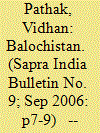

|
|
|
| 8 |
ID:
099577
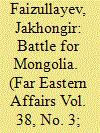

|
|
|
|
|
| Publication |
2010.
|
| Summary/Abstract |
The Russian leaders have been stepping up efforts in recent years to promote political and economic cooperation with Mongolia. Following the breakup of the U.S.S.R., Russia's positions on the Mongolian market have weakened gradually, to a point where it has been forced to fight back for the niche it has lost, now against very strong competition from other countries' leading companies.
|
|
|
|
|
|
|
|
|
|
|
|
|
|
|
|
| 9 |
ID:
046182


|
|
|
|
|
| Publication |
London, Earthscan Publications Ltd., 2002.
|
| Description |
xviii, 278p.
|
| Standard Number |
185383937X
|
|
|
|
|
|
|
|
|
|
|
|
Copies: C:1/I:0,R:0,Q:0
Circulation
| Accession# | Call# | Current Location | Status | Policy | Location |
| 046082 | 333.91/BAR 046082 | Main | On Shelf | General | |
|
|
|
|
| 10 |
ID:
116068
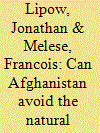

|
|
|
|
|
| Publication |
2012.
|
| Summary/Abstract |
Recent discoveries of significant mineral deposits offer Afghanistan the opportunity to attain a level of economic development sufficient to stabilize that country's volatile security situation while providing Afghans with a reasonable standard of living. Much, however, depends on whether Afghanistan can avoid the "Natural Resource Curse," an inter-related set of economic and social pathologies that often bedevil resource-endowed countries. In this article, the authors describe the Natural Resource Curse, evaluate the obstacles it raises for Afghan economic development, and offer a strategy to minimize the risks Afghanistan faces in its efforts to exploit its mineral wealth for the benefit of the population.
|
|
|
|
|
|
|
|
|
|
|
|
|
|
|
|
| 11 |
ID:
078938
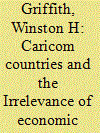

|
|
|
|
|
| Publication |
2007.
|
| Summary/Abstract |
The pioneers of development argued that natural resources determined a country's economic structure of production. Since a small country would of necessity have a smaller endowment of natural resources than a large country, they further argued that the economic structure of production of a small country would be more concentrated than that of a large country. This article contends that economic smallness is no longer an important determinant of a country's economic structure of production. The global economy is becoming more and more integrated and knowledge skills have become the most important resource in production processes. If, therefore, small countries such as those in Caricom can accumulate in sufficient quantities the appropriate knowledge skills, they can have a diversified economic structure of production by developing new products and services, and by attracting foreign direct investment
|
|
|
|
|
|
|
|
|
|
|
|
|
|
|
|
| 12 |
ID:
149848
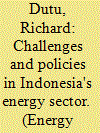

|
|
|
|
|
| Summary/Abstract |
Fossil fuels are central to Indonesia's energy policy, and its main source of export revenues. However, insufficient investment, the lack of transport infrastructure and an unwieldy regulatory environment are inhibiting the sector from reaching its full potential. Looking ahead, growing environmental concerns combined with sharp falls in coal prices and the on-going shale gas revolution call into question the sustainability of an energy strategy based almost exclusively on fossil fuels. This viewpoint challenges Indonesia's current energy policy and proposes ways to increase its energy efficiency and use of renewables. In particular, its gas sector should be further developed to plug the gap until sufficient renewable energy, especially geothermal, comes on line. Government control over the oil industry via state-owned Pertamina should be gradually reduced. Clarifying, streamlining and publicising simple regulations in energy, especially regarding land rights and on-shore processing, and removing foreign-ownership restrictions will help bring much needed investment. The pressure on the environment of natural resource exploitation should also be addressed by properly defining property rights and regulations regarding forest land, and implementing a positive implicit carbon price.
|
|
|
|
|
|
|
|
|
|
|
|
|
|
|
|
| 13 |
ID:
109242


|
|
|
| 14 |
ID:
103910
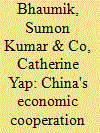

|
|
|
|
|
| Publication |
2011.
|
| Summary/Abstract |
Chinese firms undertake large scale contracted projects in a number of countries under the auspices of economic cooperation. While there are suggestions that these activities are an extension of China's soft power aimed at facilitating Chinese foreign direct investment (FDI) in those countries, often for access to natural resources, there is no systematic analysis of this in the literature. In this paper, we examine China's economic cooperation related investment (ECI) over time. Our results suggest that the pattern of investment is indeed explained well by factors that are used in the stylised literature to explain directional patterns of outward FDI. They also demonstrate that the (positive) relationship between Chinese ECI and the recipient countries' natural resource richness is not economically meaningful. Finally, while there is some support for the popular wisdom that China is willing to do business with countries with weak political rights, the evidence suggests that, ceteris paribus, its ECI is more likely to flow to countries with low corruption levels and, by extension, better institutions.
|
|
|
|
|
|
|
|
|
|
|
|
|
|
|
|
| 15 |
ID:
110019
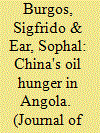

|
|
|
|
|
| Publication |
2012.
|
| Summary/Abstract |
China aims to secure, across the globe, the natural resources and raw materials needed to sustain the rapid economic growth in its manufacturing and industrial sectors. Among the many critical resources needed to fulfill its variegated energy needs, oil is by far the most important one given that it fuels its economic engine. Angola's vast oil reserves and flexible production levels make it a leading producer and exporter of crude oil. It quickly became a strategic oil supplier to China. In 2010, Angola supplied one-quarter of China's oil imports.
|
|
|
|
|
|
|
|
|
|
|
|
|
|
|
|
| 16 |
ID:
100061
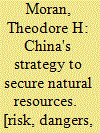

|
|
|
|
|
| Publication |
Washington, DC, Peterson Institute for International Economics, 2010.
|
| Description |
xi,54p.
|
| Standard Number |
9780881325126
|
|
|
|
|
|
|
|
|
|
|
|
Copies: C:1/I:0,R:0,Q:0
Circulation
| Accession# | Call# | Current Location | Status | Policy | Location |
| 055491 | 333.70951/MOR 055491 | Main | On Shelf | General | |
|
|
|
|
| 17 |
ID:
188602
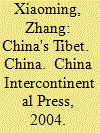

|
|
|
|
|
| Publication |
China, China Intercontinental Press, 2004.
|
| Description |
148p.pbk
|
| Standard Number |
7508506081
|
|
|
|
|
|
|
|
|
|
|
|
Copies: C:1/I:0,R:0,Q:0
Circulation
| Accession# | Call# | Current Location | Status | Policy | Location |
| 060283 | 951.506/XIA 060283 | Main | On Shelf | General | |
|
|
|
|
| 18 |
ID:
118875


|
|
|
| 19 |
ID:
095453


|
|
|
|
|
| Publication |
Hyderabad, ICFAI University Press, 2008.
|
| Description |
x, 247p.
|
| Standard Number |
9788131420263
|
|
|
|
|
|
|
|
|
|
|
|
Copies: C:1/I:0,R:0,Q:0
Circulation
| Accession# | Call# | Current Location | Status | Policy | Location |
| 054886 | 338.5/KRI 054886 | Main | On Shelf | General | |
|
|
|
|
| 20 |
ID:
090044
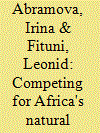

|
|
|
|
|
| Publication |
2009.
|
| Summary/Abstract |
The growing lack of resources is one of the true and fundamental reasons for the worsening and latent local, regional and global crises in the new millennium. The presence or absence of natural resources have direct effects on people's living standards, the prospects of social and economic development of states, stability of the world economy and international security.
|
|
|
|
|
|
|
|
|
|
|
|
|
|
|
|
|
|
|
|
|